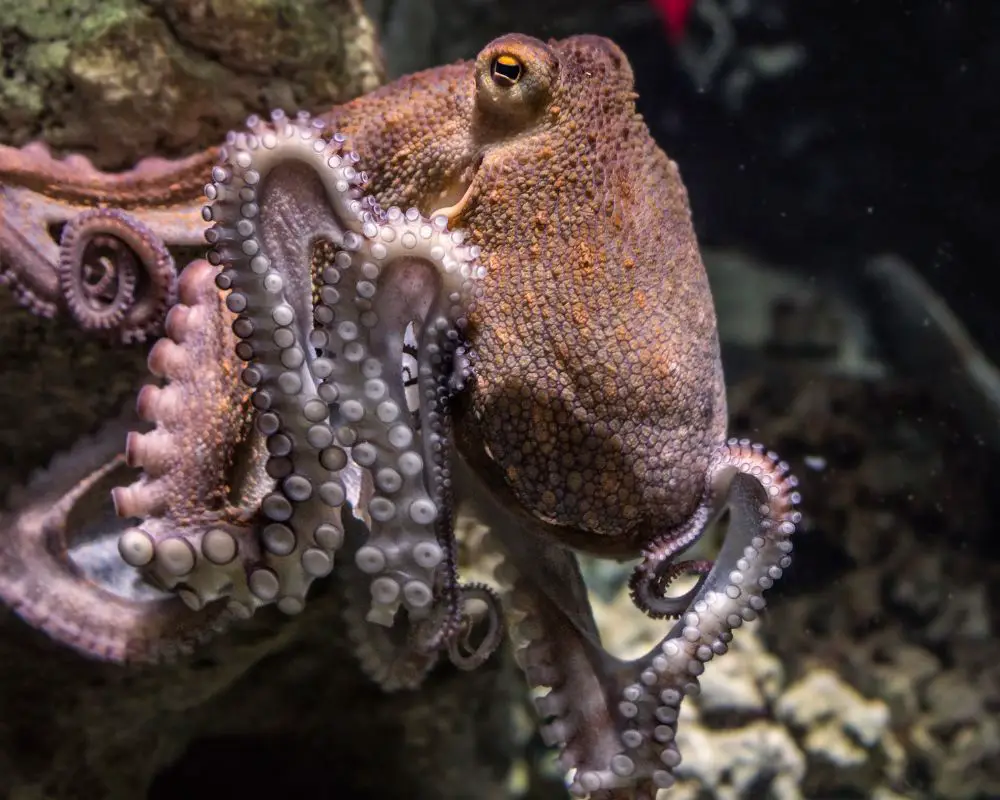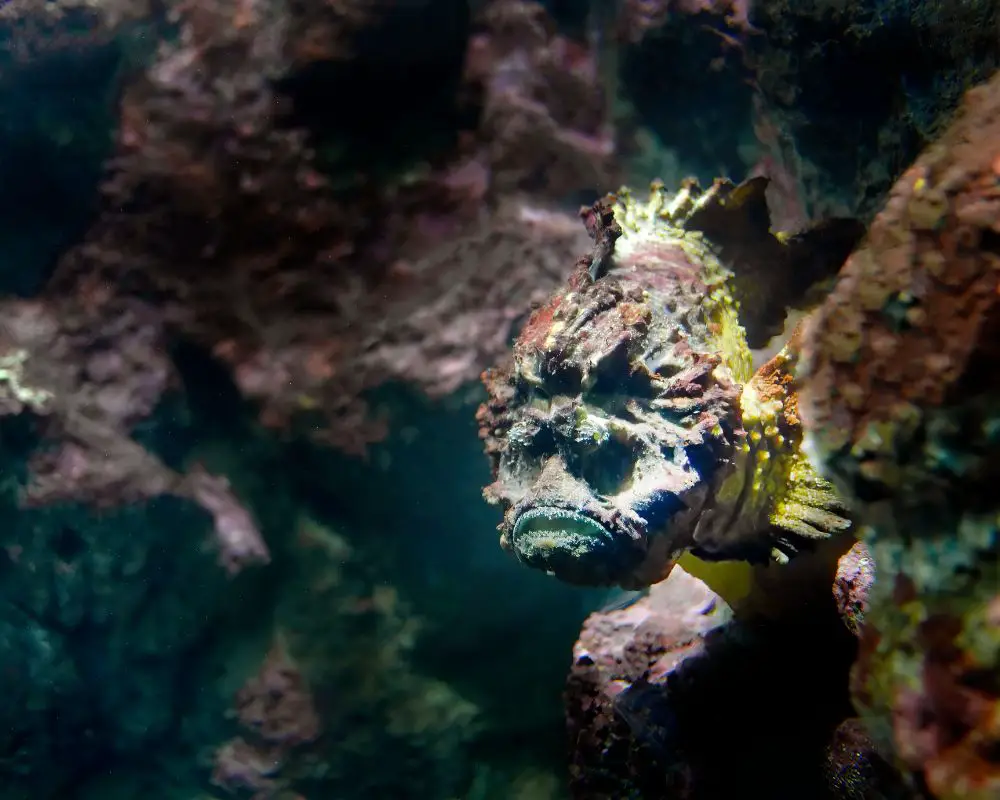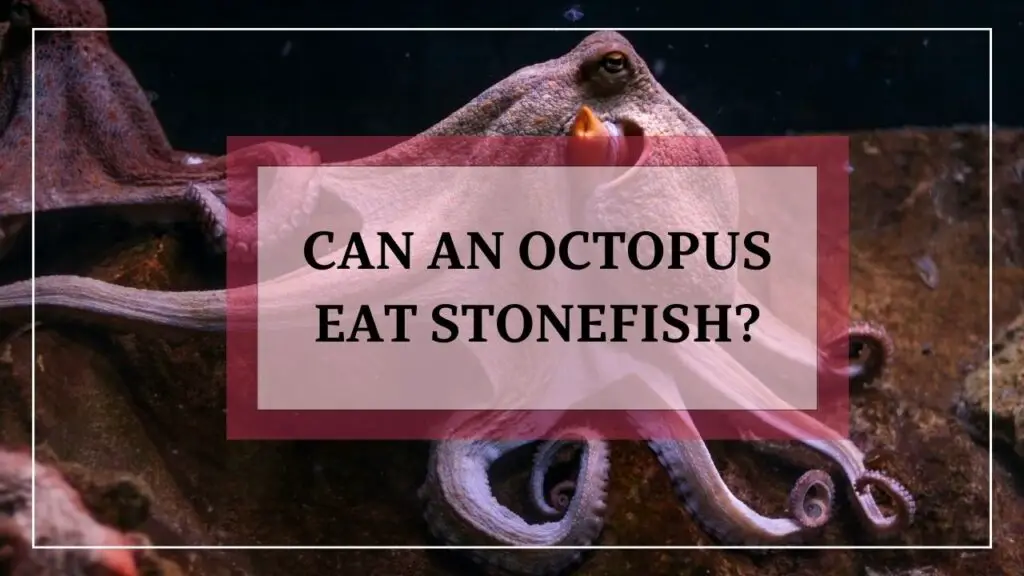Today, we’re diving deep into the mesmerizing world of ocean creatures to answer a very interesting question: Can octopus eat stonefish? But before we get into the details, let’s make sure everyone is on the same page.
Octopuses are incredibly smart and fascinating creatures with eight arms, a squishy body, and an uncanny ability to change colors. They’re like underwater superheroes! Octopuses have a diverse diet and can munch on all sorts of tasty treats, like crabs, clams, and even fish.
Now, let’s meet the stonefish. These remarkable fish have a knack for blending in with their surroundings, thanks to their incredible camouflage skills. They have spines on their back that contain venom, which helps them protect themselves from predators. It’s like their secret weapon!
So, to answer the big question, yes, octopuses can eat stonefish! But it’s not an easy meal for them. Stonefish have some tricky defense mechanisms to keep themselves safe. It’s a battle of wits and survival skills between the clever octopus and the well-protected stonefish.
In this blog post, we’ll explore how octopuses hunt, what makes stonefish so unique, and how these two creatures interact in the wild.
The Predator-Prey Relationship:
Alright, let’s talk about the chances of an octopus bumping into a stonefish in its natural hangout spot, the ocean! Now, octopuses and stonefish both call the ocean their home, but their encounters aren’t as common as you might think.
You see, stonefish are masters of disguise. They have this incredible ability to blend in with their surroundings using their excellent camouflage skills. It’s like they have a built-in invisibility cloak! So, even though octopuses have sharp eyes, spotting a stonefish among the rocks and corals can be quite a challenge.
But wait, there’s more! Visual recognition plays a vital role when it comes to hunting for both octopuses and stonefish. Octopuses have super sharp eyesight, allowing them to identify potential prey, like the clever stonefish, from a distance. So, if an octopus manages to spot a sneaky stonefish, it’s game on!
Octopus vs. Stonefish


Now, let’s dive into the thrilling battle between the octopus and the stonefish. Picture this: the octopus, armed with its wily hunting techniques, faces off against the stonefish, armed with venomous spines and a talent for evasion.
Our clever octopus is a bit of a mastermind when it comes to hunting. It uses a combination of stealth, patience, and lightning-fast movements to overpower its potential prey. Plus, those eight flexible arms come in handy for snatching up their targets like a seafood-loving superhero!
But hold on tight, because the stonefish has some seriously cool defense mechanisms up its sleeve—or should I say, up its spines! These sneaky fish are equipped with venomous spines on their back. If a predator tries to take a bite, they’re in for a nasty surprise. Ouch! Not to mention, the stonefish is a pro at slipping away into the nooks and crannies of the reef, making it quite the escape artist.
Cases Of Octopus Preying On Stonefish
Now, let’s talk about some real-life encounters between octopuses and stonefish. There have been documented cases and studies where octopuses have been spotted chowing down on stonefish like it’s a fancy seafood dinner!
One particular study observed an octopus using its cunning strategies to outwit a stonefish. The octopus, with its smarts and quick reflexes, managed to snatch the stonefish right out of its hiding place. Talk about an underwater ambush!
But what does this mean for our octopus’s diet and survival? Well, munching on a stonefish can be a risky business. Those venomous spines could pose a danger to our clever cephalopod friend. So, while octopuses might enjoy an occasional stonefish snack, they’re careful not to make it a regular part of their menu.
Adaptations and Strategies
Let’s uncover the secret weapons of our clever octopus when it comes to snatching up those elusive stonefish. These amazing creatures have some pretty nifty adaptations up their sleeves, or rather, up their suckers!
A. Octopus Adaptations For Stonefish Prey:
First, we have to talk about their intelligence. Octopuses are incredibly smart cookies. They have big brains for their size and are known for their problem-solving abilities. When it comes to capturing stonefish, octopuses use their smarts to plan and execute their moves. It’s like a strategic game of hide-and-seek, but underwater!
Next, we have the octopus’s superpower: camouflage. These masters of disguise can change the color and texture of their skin to blend in with their surroundings. They can match the pattern and even mimic the texture of rocks and corals. It’s like they have their own underwater invisibility cloak! With this ability, octopuses can sneak up on stonefish without being noticed.
But wait, there’s more! Octopuses have an advantage with their flexible bodies and dexterous arms. Those eight tentacles are like the Swiss Army knives of the ocean. They can reach into tight spaces, wrap around their prey, and handle venomous stonefish like a pro. It’s like having a bunch of extra hands to grab and control their catch. Talk about multitasking at its finest!
B. Stonefish Countermeasures:
Now, let’s shine the spotlight on the stonefish and their clever defense mechanisms. These fish have some tricks up their fins to deter would-be predators, including our crafty octopus friend.[1]
First, we have to talk about those venomous spines. The stonefish has a row of sharp spines along its back, and each one is armed with venom. If a predator, like an octopus, tries to take a bite, they’re in for a painful surprise. It’s like having a built-in security system that says, “Back off!”
But it doesn’t end there. Stonefish are masters of disguise and immobility. They have this remarkable ability to blend in with their surroundings, thanks to their camouflage skills. It’s like playing hide-and-seek with a stonefish, and they’re the masters of hiding. They can sit still for long periods, perfectly blending with the reef or the sandy ocean floor. It’s like they become part of the scenery!
C. Coexistence And Balance:
Now, let’s talk about the bigger picture—the coexistence of octopuses and stonefish in the vast marine ecosystems. These creatures play important roles in maintaining balance in the underwater world.
Octopuses and stonefish are part of a delicate predator-prey balance. While octopuses might enjoy the occasional stonefish snack, they don’t rely solely on them for sustenance. Their diverse diet includes other marine creatures, like crabs and mollusks. It’s like having a varied menu to satisfy their taste buds.
Maintaining a balance between predator and prey populations is crucial for the health of marine ecosystems. If octopuses were to gobble up all the stonefish, it would disrupt the natural order. Stonefish also have their own predators, and their survival contributes to the overall balance of the oceanic food web. It’s like a well-choreographed dance of life in the underwater realm.
FAQs
Can Octopuses Get Hurt By The Venomous Spines Of A Stonefish?
No worries, my friend! Octopuses are pretty smart when it comes to handling stonefish. While the venomous spines of a stonefish can be dangerous to other predators, octopuses have been observed using their dexterous arms to carefully grasp the stonefish without getting pricked. It’s like they have a built-in defense against those venomous spines!
Are Octopuses The Only Predators Of Stonefish?
While octopuses are known to enjoy a stonefish meal from time to time, they are not the only predators in town. Stonefish have a range of natural enemies, including larger fish like groupers, eels, and even some species of rays. So, it’s safe to say that stonefish have to watch for more than just the clever octopus!
Do Stonefish Always Rely On Their Camouflage To Stay SCafe?
Great question! While stonefish are experts at blending in with their surroundings, camouflage is not their only defense strategy. They have those venomous spines we talked about earlier, which are their primary means of defense against predators. Their immobility and ability to hide in crevices and rock formations also provide an added layer of protection. So, it’s a combination of camouflage, venomous spines, and their knack for hiding that keeps stonefish safe in the ocean.

